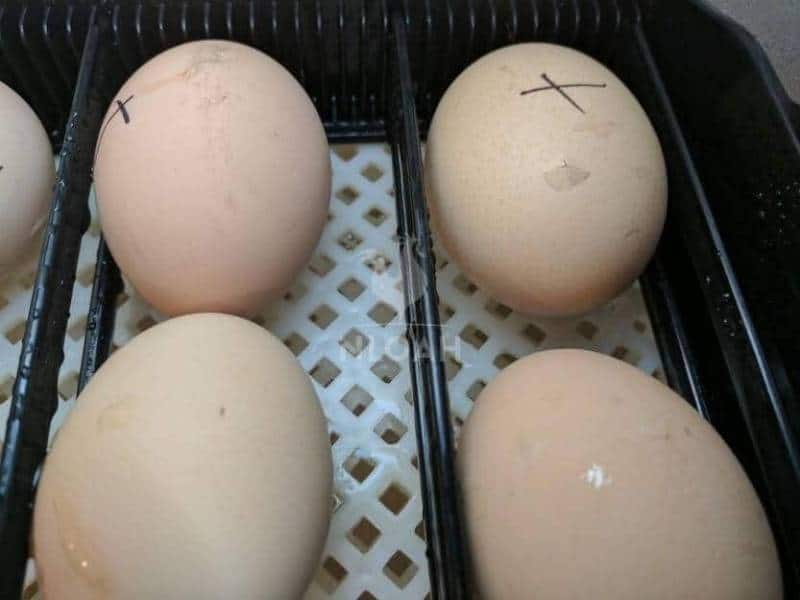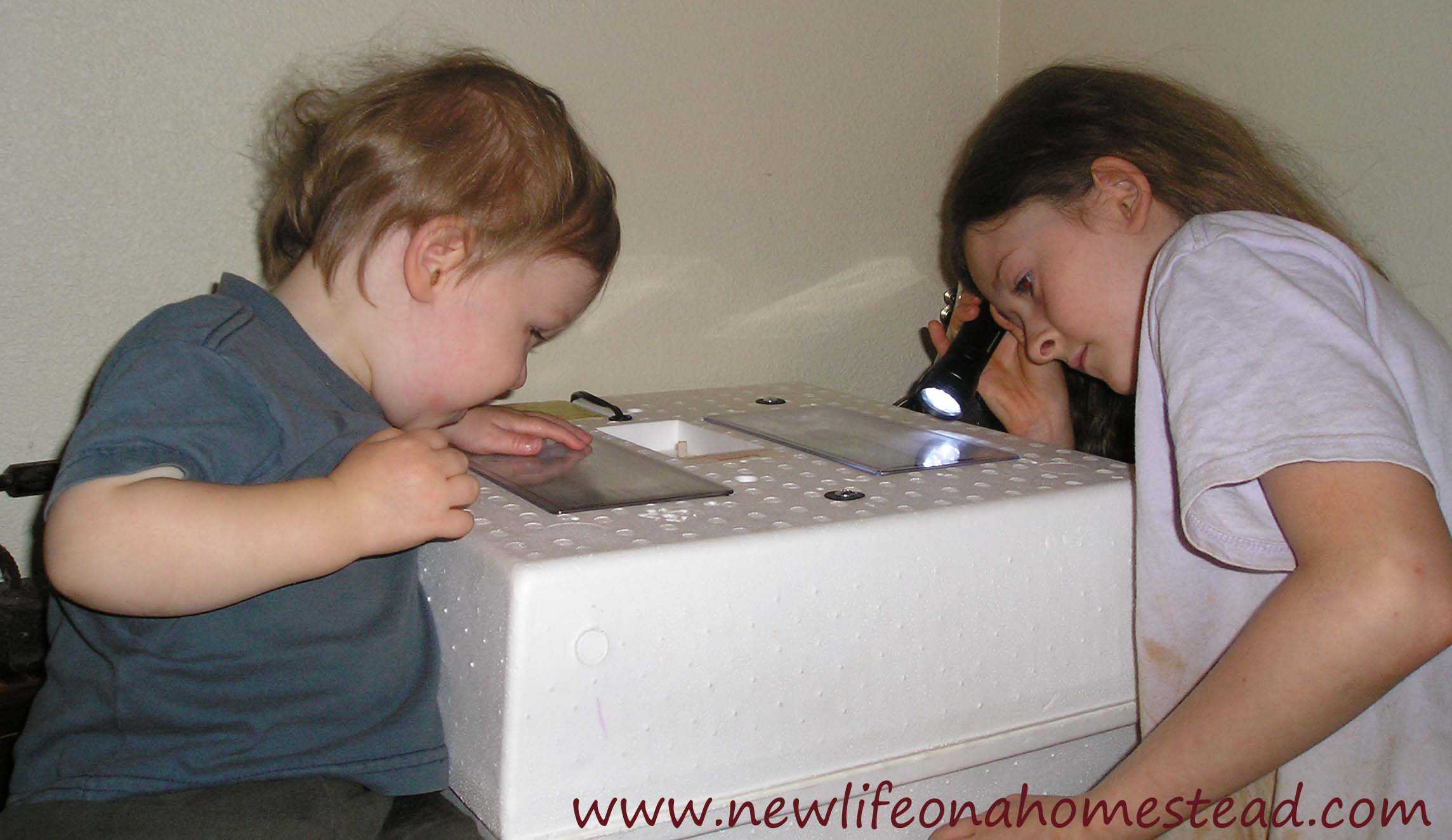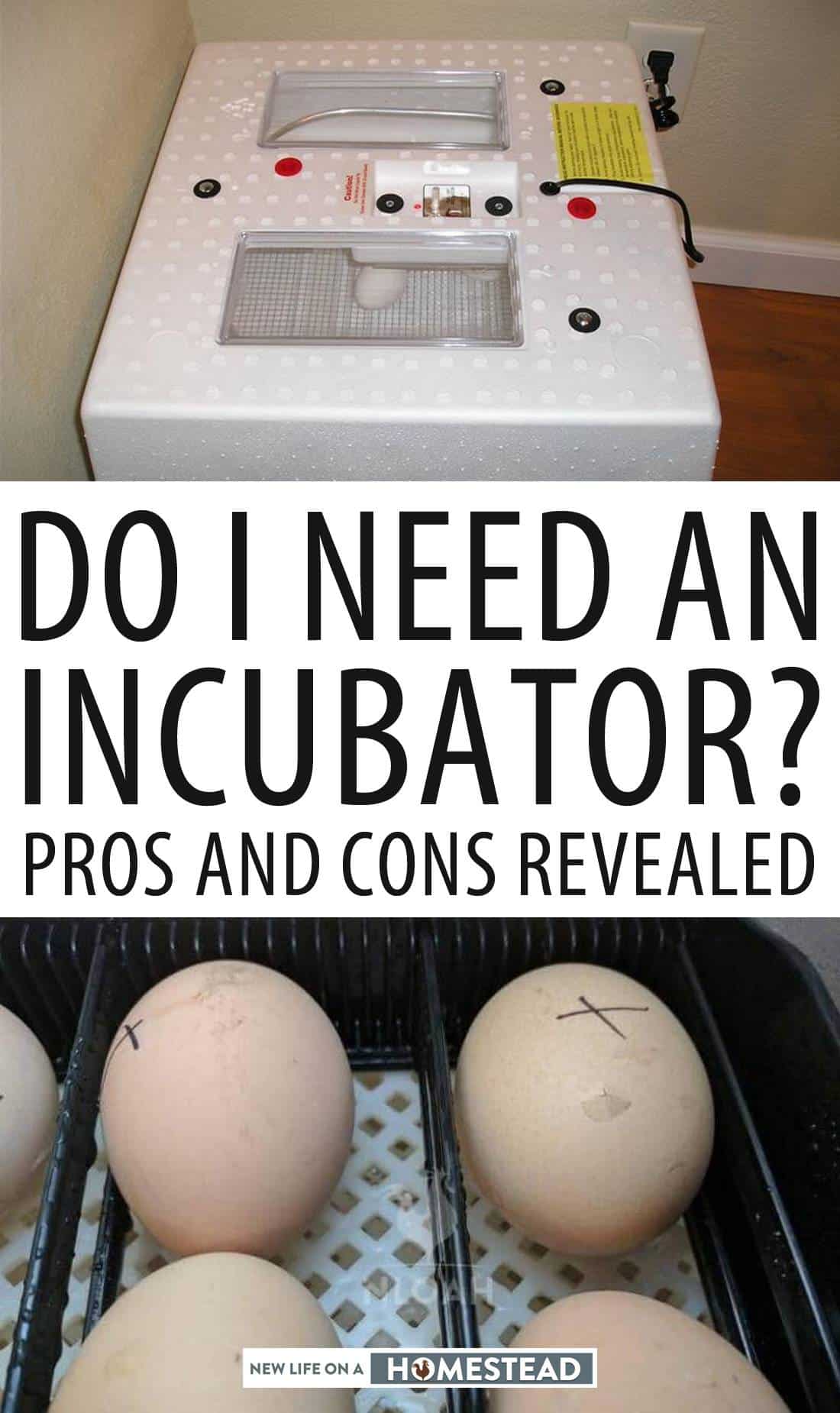As of now, we have our first two eggs in our brand new incubator. I’m thinking we should collect six eggs total to begin with. For the next few days, as the girls lay I’ll be placing whatever eggs we get from the Leghorns into the incubator.
I’m only collecting the eggs from them because they are with the Rooster. We are writing the date laid on the egg with a pencil before incubating.

There are some things you should know about deciding to buy an incubator.
Before we ever had chickens, I often wondered why people even needed incubators. I mean, if a hen sits on her eggs to hatch them, why would you bother buying an incubator to do it yourself?
Many people are wondering if they need to buy an incubator for their eggs. The short answer is no. You do not need to use an incubator if you want to save some money.
You can use a broody hen to hatch your eggs instead. Deciding not to use an incubator can also make your life easier when it comes to brooding chicks, as the mother hen will take care of all of that for you.
I’ve done some research on whether you actually need an incubator – here’s what I found out.
Do I Need an Incubator? 8 Reasons to Consider an Incubator
Lack of Broodiness
In a recent Mother Earth Magazine article, I read that unfortunately the instinct to go “broody”, or sit on a clutch of eggs, has been bred out of a lot of chickens. None of my hens have gone broody yet… I’m wondering if they ever will.
Some hens simply do not ever sit on their eggs. This would be a good reason to get an incubator.
To Keep Eating Your Farm Fresh Eggs
If you are fortunate enough to have a good sitter, you may find yourself facing another dilemma… no eggs to eat! Of course, you could reach under her and steal away an egg for your breakfast, but if you are wanting to increase your flock size then you’ll just have to wait until Mama is done with her job and the little chicks are all hatched out.
*For those of you who are wondering, Yes, you can steal away an egg from underneath a sitting hen without cracking it to find a chicken embryo. When a hen starts sitting, it’s wise to begin dating the eggs she’s on. That way you’ll know how long they’ve been there. If you get an egg that’s only a few days old, it is still safe to eat.
If you want to increase the amount of chickens you have, but don’t want to wait until they are all hatched out to enjoy your farm fresh eggs again, an incubator would solve both problems.
Once you’ve collected as many eggs as you’d like to try to hatch, and safely placed them in your incubator, you’d then be free to resume gathering eggs for your morning omelets.

If You Want to Introduce New Breeds
Of course, you can always introduce new chicks from another breed directly into your flock rather than incubating your own eggs. You can also use a rooster from another breed to introduce those new genetics to your hens, but that’s going to result in some mixed breeding that might not produce quite the effects you are looking for.
Because of this, using an incubator is a good choice if you want to hatch your own chicks and want to start raising a new breed. You can order fertile hatching eggs and hatch them yourself at home – without gambling on whether a broody hen will accept these new eggs as her own.
You Don’t Want to Deal With Poor Mothers
While some hens do naturally go broody with ease, that doesn’t always mean that they will make great mothers. Incubating your own eggs and raising the chicks in brooders is a good way to ensure your chicks survive.
Sadly, some hens just aren’t cut out for the demands of motherhood and even after sitting on the eggs for a full 21 days and hatching them, they will often lose interest in caring for their young. Even worse, they sometimes maim or kill their own chicks so you could find that all the work involved in encouraging yoru hen to go broody and sit on her eggs is wasted.
You Want Friendlier Chicks
Chicks hatched beneath a hen and then raised by that same hen do, admittedly, tend to be a bit more savvy about the ways of the world than those that are hatched “artificially” in an incubator and then reared in a brooder for the first few weeks of life.
However, you do have to worry about them being not quite as friendly. When you raise chicks in the brooder, you’ll be interacting with them everyday and this kind of interaction often encourages the little ones to be much more people-friendly.
You Are Worried About Predators
The worry about the chicken and the predator is an age-old story that all chicken keepers recognize all too well. Unfortunately, it’s not just foxes and coyotes that you have to worry about going after your chickens – you also have to worry about certain predators targeting your chicks and the unhatched eggs.
Hatching eggs and baby chicks alike are vulnerable to predators like rats and snakes in the coop. If you incubate your own eggs, you don’t have to worry about anything getting to them. Believe it or not, even other chickens are often to blame for predation, eating eggs that are partially incubated beneath their mothers when she gets up to get a snack or a drink of water.
You Want the Freedom to Hatch Whenever You Want
For those of us that live in colder climates, using an incubator is a great way to provide additional freedom in the hatching process. You can incubate year-round, allowing you to raise up your own chicks even in the dead of winter.
Because you can control the humidity and temperature, even in unpredictable weather, you’ll have a much higher hatch rate.

You Want to Watch the Chicks Hatch
Although there’s nothing quite as charming as watching a mother hen following her chicks around the coop and run, you probably won’t be able to watch the hatching process if you allow the hen to hatch your eggs for you. You will usually not be able to see the process since the hen will still be sitting on the eggs as they hatch.
With a classic incubator you’ll have a clear top so you can watch the chicks as they pip out of the shell. This is a great experience, in particular, for children!
What to Use If You Don’t Have an Incubator
There are lots of benefits associated with not using an incubator, too. The first is that it requires minimal equipment.
Incubators can be expensive, with some models costing $200 or more (at the very least!). Plus, you’ll have to pay for things like an egg candler, automatic turner, thermometer and hygrometer, and more.
Of course, you’ll also have to worry about all of the work involved in turning the eggs on a daily basis and then caring for the chicks once they hatch in a brooder, typically for at least eight weeks.
Here are some alternatives to using an incubator to hatch your own eggs.
Use a Broody Hen
Hatching eggs under a broody hen really just requires two things – the hen and her clutch of eggs. Of course, in a perfect world, the hen will sit on the eggs for 21 days without breaking a single one and she will then raise them up as her own.
Naturally, this rarely happens and things seldom go according to plan – but if you can make it work, then hatching eggs under a broody hen rather than an incubator is a great option.
To make this work, you’ll need fertilized eggs just as you would if you were incubating them. Because of this, you’ll need to maintain a flock that has a rooster. Hens are more likely to go broody and sit on their eggs in the spring but that’s not always the case.
You can increase your odds of hatching eggs without an incubator by selecting a breed of hen that tends to go broody more easily, such as:
- Cochins
- Silkies
- Orpingtons
- Sussex
- Brahmas
Hybrid breeds rarely go broody so choose one that is more likely to sit so your odds of a successful hatch are higher.
The benefits of using a hen to hatch your eggs is tenfold. First, you don’t need electricity or heat lamps in a brooder box – the hen serves as the brooder box for you in addition to the incubator. She’ll also turn them regularly, making sure they spend equal amounts of time on each side for even warming. She will also regulate the humidity in the news since she’ll remove her breast feathers to allow for skin-to-egg-contact.
Believe it or not, it’s believed that broody hens can also detect when an egg is not fertile and they can kick those eggs out of the nest so you don’t need to candle them! The mother hen will also teach her young to drink, eat, forage, dust bathe, and more – your hen-hatched chicks might be a little more world-wise as a result.
Sinec the rest of the flock will be used to the chicks being in the coop and running right from the get go, you may have fewer issues with fighting when you introduce the babies, too.
Make a DIY Incubator
If your only reason not to use a store bought incubator is due to cost (and not the labor involved), then you might want to consider making a DIY incubator.
You can do this with a plastic bin. Drill several 3/8 “ holes in the lid to increase ventilation and make sure these are evenly distributed around the lid. The bin should be large enough to let all of your eggs lay flat as well as to contain an incident lamp (the desk lamp, gooseneck style is the way to go).
If you’re incubating a lot of eggs in this set-up, you may need to use an additional lamp so make sure the bin can accommodate that as well.
Lay a terry cloth towel down on the bottom of the bin, then put the lamp or lamps inside. You’ll want to position the lamp so that it offers heat around 100 degrees to the surface temperature of the eggs. Check the temperature with a thermometer daily.
You will also need to mist the eggs every day with a spray bottle, making sure the humidity of the bin remains around 60%. Turn the eggs five times a day.
To make your DIY incubator, you can use all kinds of materials for the container. While a plastic bin like a Rubbermaid tote is the best option, you can also use an Igloo cooler (this will help maintain even temperatures since it is naturally insulated) or a double layer of cardboard boxes (just add some strips of wool or newspaper between the two boxes for added insulation).
You can even incubate eggs in an old kitchen cabinet, a 10-gallon aquarium (ideally lined with wool or Styrofoam for insulation), a Styrofoam cooler, and more.
Ultimately, your container just needs to be something that offers you the ability to control both humidity and temperature. Even the slightest fluctuation in either variable can be lethal to developing embryos.
When Is Incubating Your Own Eggs the Way to Go?
Some people wonder if they need an incubator for eggs, but the answer is that you don’t. There are a few instances in which you might want to use one, such as when you have a lot of eggs and not enough space in your fridge; or when the power goes out and your fridge can’t run.
These are the two reasons why we decided to get an incubator. We chose not to buy the extra automatic egg turner accessory, trying to save some money. The incubator itself was $40, and the egg turner was another $40. But now, after trying to remember to turn the eggs several times a day for the past couple of days, we are wishing we had one! I’d say, if you can afford it, get one.
updated 05/06/2021 by Rebekah Pierce


A city girl learning to homestead on an acre of land in the country. Wife and homeschooling mother of four. Enjoying life, and everything that has to do with self sufficient living.

When we were doing eggs (a LONG time ago – like 30 years). My mom put an x on one side and an 0 on the other. She could just look and tell if she had turned them and which ones still needed to be turned.
Oh you got a bator!!! I didn’t have such great luck with my first hatch. I did like you and didn’t buy a turner and forgot to turn sometimes. Life gets busy. I decided to turn at meal times. That seemed easier to remember. Cook food turn eggs 🙂
Hatching eggs is not easy so be patient with yourself. If you hatch 50% in this kind of bator consider yourself an expert. Email if you have questions. Everyone needs a hatch buddy 🙂
I checked youtube for homemade incubators and found that I could make my own for around 10 bucks. I got the first batch of eggs in now and everything is going good. I’ve candled the egss an so far all are fertile and growing every day. They should hatch around the end of the month. I’ll let you know what happens. I do have to turn the eggs though, no homemade turner unfortunately. 🙁
Well I hesitate to say that because once they start germinating I have such a hard time disposing of any. It’s the whole “is it an embryo” thing LOL!!! I know it’s just a chicken but it’s hard. If it were me we’d probably follow through on the hatch and pray hard :D. IN the future though just gather them and leave them in a basket in the house and when you have enough start the batch.
Chicken Whisperer is right about putting them in the same day. Doesn’t matter when they’re laid. Save them up and put them in all at once. The humidity settings are different at different times of the hatch and when you have some hatching earlier than others you risk harming them if they’re not on the same schedule and you change the humidity.
Kim- so should I take these out and put them back in when I have more? Or are these wasted?
LOL once I got a batch of girls that would set for me I gave up my incubator days. I’m SO glad to just wake up one morning with a batch of babies running around. No heat lamps, no special feeders or waterers. None of that. Congrats on your purchase though. MAN that first batch of eggs… when you hear them cheeping or see them rocking it’s SOOOO exciting!!!!!
Hey,
Do yourself a favor and collect all the eggs, and then put them all into the incubator at the same time. It’s not a good idea to add eggs on different days because they will all hatch at different times and you don’t want the hatching chicks to roll around and disturb the unhatched eggs/chicks. You will probably keep the baby chicks in the incubator for about 24 hours to dry out before moving them to the brooder anyway. Just a friendly suggestion. Good luck with your hatch!
CW
I have an incubator and am using it currently, but I also bought some buff orpington chicks hoping that they will go broody as they are known to do. I plan on increasing several flocks of chickens, ducks, and even turkeys. So, I’m hoping she’ll be a good mommy for me, so I don’t have to rely on an incubator.